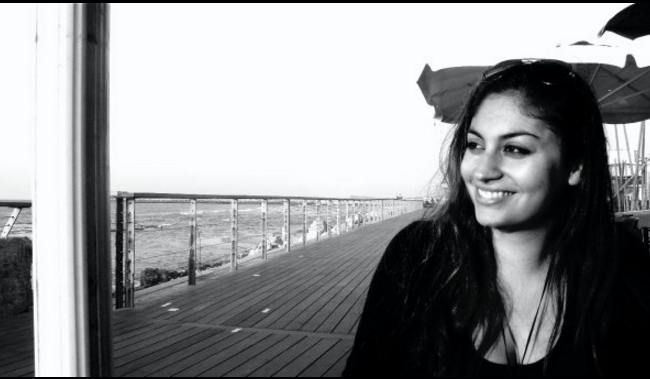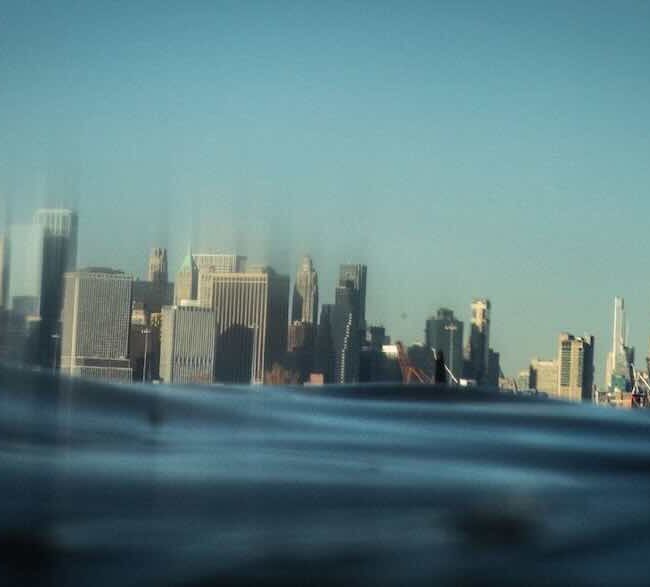A Conversation With Patrick Bresnan & Ivete Lucas (NAKED GARDENS)
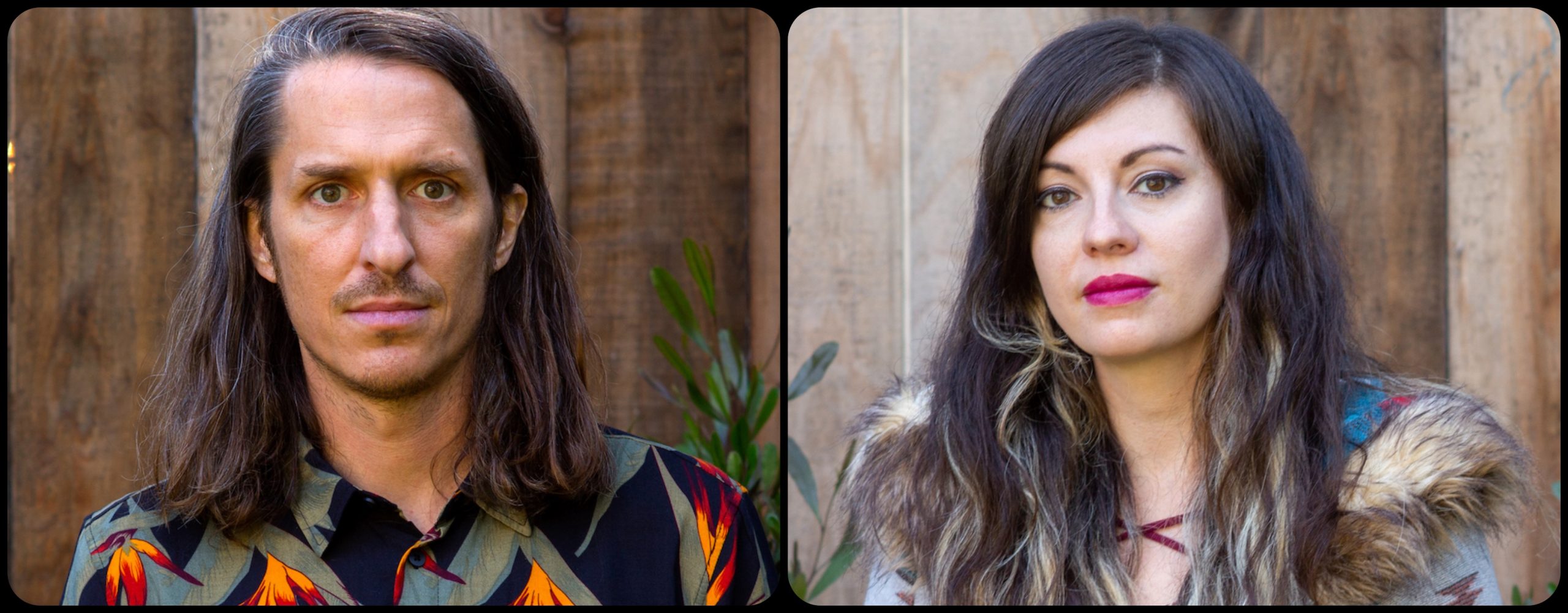
Wife-and-husband duo Ivete Lucas and Patrick Bresnan (Pahokee) just premiered their latest documentary, Naked Gardens, at the 2022 Tribeca Film Festival (where I reviewed it). The film is a profile of the administrators and residents at Sunsport Gardens, a naturist resort in Florida. Without judgment, Lucas and Bresnan train their camera on folks who choose to live their life without the burden of clothes, many of them starting fresh after some kind of economic or family crisis. As much nudist colony as refuge, this private park near West Palm Beach is a safe space for those who both make it their home and just come to visit. During Tribeca, I spoke with the directors via Zoom and what follows is a transcript of that conversation, edited for length and clarity.
Hammer to Nail: How did you find Sunsport Gardens and then decide to make a film about it?
Patrick Bresnan: My family lives in West Palm Beach, Florida, and it’s basically been my second home for about 20 years. And I always look at newspapers. So, The Palm Beach Post every so often would have a story about the nudist resort. And one very particular morning, the owner of the nudist resort and his girlfriend were on the cover of The Post and it read, “Nudist resort getting back to normal after stabbing.” It was the kind of thing you’d see in The Onion only it was very real. I was instantly kind of interested and fascinated by these two things happening in one place. And I’m also a big fan of Diane Arbus and her photography.
So, while we were working on Pahokee, we would go to West Palm Beach on the weekends to see my family and do laundry. And I was at Costco on a Friday night and a lady came up to me in the parking lot and recruited me to go to the nudist resort. She saw my long hair and she said, “You need to come to the nudist resort tonight. There’s a drum circle and a bonfire, and it’s totally free. You don’t have to pay anything to get in.” And I was like, “I’m sold. I’m there. I’ll pay to get in” (laughs). So we started corresponding with the owner Morley and he happened to be one of these people who really likes any kind of media attention and being recorded. And that kind of got the ball rolling.
HtN: He sounds like the ideal documentary subject: “Film me, please.”
Ivete Lucas: Sort of, because then those people are very aware of the camera, but I think what’s key about it, too, is that it’s been a long time that these folks have been nudists and naturists and the community was ready to start sharing what their lives were really like because they wanted to counteract some of the stereotypes. So it took us a while for them to really to get to know us enough to trust us but when they did, they really wanted to shed light on their lifestyle. And that’s when things really gelled.
HtN: Patrick, you mentioned a stabbing. Why is the stabbing not in the film?
PB: Well, we don’t make films about things in the past; our films are very present. Plus. it’s an anomaly. I mean, we see things happen everywhere: they happen at the Y, they happen at church, they happen at the park, they happen at school. And so, thank God, nothing crazy happened while we were filming.
IL: And I also think this kind of headline is precisely what we’re trying to go against, this sensationalist way of portraying nudists, where they’re either an oddity or a laughingstock. And so one of our purposes making the film was to really break the surface and show what was underneath the layer, underneath the clothes, underneath the skin, just the motivations and what it was like to make that decision to be a nudist.
HtN: Beyond the usual challenges of filming people for a documentary and respecting their privacy, what further challenges did you face making a film about naturists?
PB: There’s a challenge every time you pick up a camera and try to make a film, every day, every hour. Number one, we had crew, and we didn’t want them to be … we wanted to be naked out of respect for the community, but we had a young guy who just finished Columbia graduate film, and we needed a sound person and DIT [Digital Imaging Technician] and so he did that. And I wasn’t about to make him get naked, but him being there with his clothes on was very offensive to a lot of people at the resort. So we tried to overcome that by having our crew wear beige-colored bathing suits and spandex but it was very challenging for them, I think.
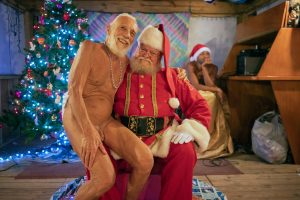
A still from NAKED GARDENS
And also, I think something that’s very challenging about documentary is there are a lot of things under the surface, psychologically, that people are going through that have led them to some of these decisions and you are learning that every day and you’re trying to unpack it when you go home: what does it mean? For a lot of people who have had trauma, talking about it helps them. And then when you’re a filmmaker, you have to go home and process that. And I think that’s incredibly difficult and something that we dealt with a lot on this film.
IL: At this particular resort, there’s a sort of socialist ideal behind it where anybody who wants … I mean, the owner Morley, he very deliberately wanted anybody that wanted to have this lifestyle to be able to afford it. So it’s a very affordable place to live and really the most affordable place to live in Southern Florida. And so there are people that are there because it’s cheap because we are in a housing crisis and there are people who are below the poverty line. There was a mom and daughter who used to be homeless.
HtN: Serenity and her mom, according to your press notes, right?
IL: Right. So they used to live in a car and then they moved there and now they live in an RV. But with that comes a lot of other social difficulties. And we have to understand that. And that’s something that we face: we have to understand that we’re filmmakers, we’re not psychologists, we’re not social welfare people. And in dealing with these things, we ended up saying, no matter how small our budget is, we have to hire a mental-health consultant, a social-welfare consultant, and try to offer any help that we could to the people there. Because it is that line that we’re always walking around. I capture these things and I have a lot of responsibility to show the world what’s going on, but also, I am a person. And if I have access to something that could help people, can I get them close to those things that I have access to? So we had to do that, as well.
HtN: Wow, you are model filmmakers! What about the minors in the film? People like Serenity and the other children. I noticed you were very careful about how you showed their bodies. What kinds of challenges did you face around that? And did you have any concerns about their agency in this community? Because obviously, they’re children and they can’t make decisions that adults could.
IL: Well, they can’t make the decision to be there, right? That’s the decision of their parents and their parents really want to raise them there. And I was pregnant while making the film and we’re husband and wife. So we are very much a family making a film in the resort and the resort calls itself a family naturist resort. So part of being there was exploring what that means, and what that means is that there are family there with children. So we wanted to show that lifestyle, but we also realized that there were difficulties with that because they’re children and we wanted to protect them, as well. The families were not foreign to the conversation of whether a child can be photographed or not because everybody has a camera nowadays and there are children’s parties and everybody’s naked most of the time, though some of them not much because they were not nudist prior to moving there.
So we talked to the families a lot and told them what making a movie meant. The most important decision that we made—and we talked to the parents about—was that we were never going to show any frontal nudity of children, just because we’re media-literate enough to know that can be misused. So everything frontally is waste up. And we ended up filming with people that really wanted to be part of the film, and they wanted to show that lifestyle and that they could have the agency also to talk with their children about that in a very conscious way.
HtN: Patrick, you’re the cinematographer, and you mentioned Diane Arbus and you’re a fan of hers. Given that you didn’t want to sensationalize any of the nudity and just present it as is, what was your approach to celebrating their choices without sensationalizing it in your camera work?
PB: I’ve been doing street photography with film since I was a teenager, so for over 25 years. A lot of the time when I’m with my camera and doing camera work, it’s very second nature. There’s an aesthetic that you see in Pahokee and The Rabbit Hunt that is just kind of burnt in to who I am. So with this film, there were a lot of challenges because there were people who did not want to be filmed, and there were … I mean, I was trying to avoid gatherings with children but I still wanted to shoot the film very wide; I didn’t want to be zooming in on people. So I really wanted to keep the film somewhere between a 24mm and 35mm lens so that you could really take in the resort as this kind of quasi-paradise.
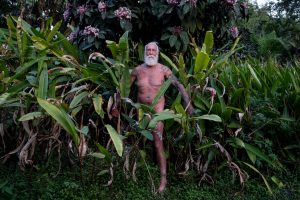
A still from NAKED GARDENS
We had this idea, cinematically, that we’re all kind of told that we’ve been pulled from the Garden of Eden. And these are people trying to rediscover Eden to create a paradise. And as humans, we’re quite imperfect. And so when we create a paradise, there are burnt-out cars, RVs, campers that have tarps over the roof … So I really wanted for all of this to be portrayed cinematically. And we wanted people who were comfortable being naked to be fully rendered in the film in their nudity, because that was very important to them, as well. So those were just some of the ideas and struggles with the cinematography.
IL: I think that’s also a very important choice to have Patrick’s aesthetic, this street-photography aesthetic for the human body. Because we’ve been so used to sexualizing and male-gazing the human body and trying to enhance it and collect perfect specimens and portray it that way in the media. And we were really trying to push back against it. Just like the nudists and the naturists are, we were trying to push back against that aesthetic and just show that the human body exists and show the variety of human bodies. And maybe convey an experience that we felt, as well, being there where—once you can look around you and see the imperfections and accept them and see the imperfections in yourself and display them—we can be more comfortable about who we are.
HtN: There are discussions within the film about liberation, and you open the documentary with that quote from Albert Camus’ The Rebel. What do you think this community can teach the world at large about acceptance?
PB: I think some of our characters really have revelatory moments. And what we experienced is that many people who live there had felt shame before stumbling upon this lifestyle. And as a way to overcome their shame, they discovered nudism or naturism. And through that process of revealing themselves to others and being in an environment where other people were unclothed, they were learning to love themselves. And I think that’s a very powerful lesson that we took away from the film, the importance of loving yourself enough to show others exactly who you are. And that takes an incredible amount of courage.
HtN: The words “nudism” and “naturism” are discussed at one point in the film. How do you see the difference between them?
PB: The way we saw the difference between nudism and naturism is that nudism is the desire to live unencumbered by clothing and free from the laws that restrict nudity. Nudism is a desire to be naked as much as possible in one’s daily activities and participate in social and communal activities free of clothing. A big aspect of nudism is experiencing the sun as well as water on one’s whole person. Naturism is the desire to from a deeper connection with nature with one component of that philosophy being experiencing nature in a clothing-free manner. Naturism also involves eating healthy, permaculture, and wholistic living practices focusing on nudity for health benefits.
HtN: As you pointed out, this film takes place very near Pahokee, where you shot your last feature. Are you going to move further afield for your next film? Or are you just going to stick near West Palm Beach from now on.
PB: (laughs) We’d obviously like to have a trilogy of Florida features. But we shot a short film in Austin about a newspaper delivery man that we distributed with The Guardian and now I’m in production for a new feature film in Austin about a veterinarian, a very eccentric veterinarian. And so I think we’ve had these films that are multi-character films that are very complex to assemble in the editing room, and I think we really want to see what it’s like to follow one character’s complex journey and struggles. So we’re going to try that for our next film.
HtN: Well, I look forward to the conclusion of your Florida trilogy one day. Thank you both so much!
IL/PB: Thanks, Chris!
– Christopher Llewellyn Reed (@ChrisReedFilm)








